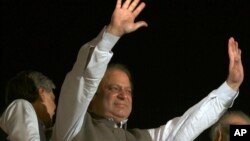The conservative party of former Pakistani prime minister Nawaz Sharif has taken a commanding lead as votes continued to be tallied Sunday for crucial parliamentary elections marred by Taliban intimidation.
As unofficial results continued to pour in, state television estimates showed Sharif's Pakistan Muslim League having easily secured enough seats to form a government and close to the majority needed to rule outright.
In a dramatic showing, former cricket player Imran Khan's Tehrik-i-Insaf, or PTI, holds second place overall and will likely control the important provincial government in Khyber Pakhtunkhwa, along the Afghan border.
The Pakistan People's Party, led by the family of slain former prime minister Benazir Bhutto, trails in third place as voters cast ballots to fill 272 seats in the National Assembly.
Officials estimated the turnout in Saturday's poll at a robust 60 percent, despite pre-poll violence and attacks that killed at least 24 people on election day itself, including at least 10 at a campaign office for the Awami National Party, one of the groups targeted by the Taliban.
In a video message Sunday, Khan welcomed the high turnout as a step forward for democracy, but said his party would submit a report on alleged vote-rigging. He spoke from the hospital bed where he is recovering from a badly injured spine after falling more than four meters to the ground at a rally in Lahore last week.
Sharif declared victory for his party late Saturday. If official results bear him out, he will likely return to the job he held twice in the 1990s.
The former prime minister is appealing to all Pakistani parties to join him in ridding the country of its problems, which include inflation, unemployment, power cuts and a Taliban insurgency.
For his part, Khan campaigned on a platform to end U.S. drone strikes in the tribal belt, saying he would order the Pakistani military to shoot down American aircraft if necessary.
Khan won his seat in parliament, while outgoing Prime Minister Raja Pervez Ashraf lost his.
This is the first time Pakistan is transitioning from one civilian government that finished a full term to another civilian administration.
Sharif was Pakistani prime minister from 1990 until 1993 when he forced to resign because of allegations of corruption. He returned to the job in 1997 but was toppled by a military coup two years later.
As unofficial results continued to pour in, state television estimates showed Sharif's Pakistan Muslim League having easily secured enough seats to form a government and close to the majority needed to rule outright.
In a dramatic showing, former cricket player Imran Khan's Tehrik-i-Insaf, or PTI, holds second place overall and will likely control the important provincial government in Khyber Pakhtunkhwa, along the Afghan border.
The Pakistan People's Party, led by the family of slain former prime minister Benazir Bhutto, trails in third place as voters cast ballots to fill 272 seats in the National Assembly.
Officials estimated the turnout in Saturday's poll at a robust 60 percent, despite pre-poll violence and attacks that killed at least 24 people on election day itself, including at least 10 at a campaign office for the Awami National Party, one of the groups targeted by the Taliban.
In a video message Sunday, Khan welcomed the high turnout as a step forward for democracy, but said his party would submit a report on alleged vote-rigging. He spoke from the hospital bed where he is recovering from a badly injured spine after falling more than four meters to the ground at a rally in Lahore last week.
Sharif declared victory for his party late Saturday. If official results bear him out, he will likely return to the job he held twice in the 1990s.
The former prime minister is appealing to all Pakistani parties to join him in ridding the country of its problems, which include inflation, unemployment, power cuts and a Taliban insurgency.
For his part, Khan campaigned on a platform to end U.S. drone strikes in the tribal belt, saying he would order the Pakistani military to shoot down American aircraft if necessary.
Khan won his seat in parliament, while outgoing Prime Minister Raja Pervez Ashraf lost his.
This is the first time Pakistan is transitioning from one civilian government that finished a full term to another civilian administration.
Sharif was Pakistani prime minister from 1990 until 1993 when he forced to resign because of allegations of corruption. He returned to the job in 1997 but was toppled by a military coup two years later.
Some information for this report was provided by AP, AFP and Reuters.





